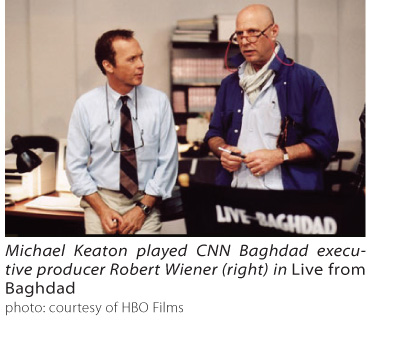| |
|

THE GLOBAL AFFAIRS DESK IN NORTHBEACH
Is there a war in Iraq, Daddy?
by Matt McFetridge
I didn’t cover the Persian Gulf war, or the American debacle in Somalia. In fact, I had never seen American boots on the ground in combat until the 2003 invasion of Iraq. Pre-2003, the wars I covered were in places like Rwanda and the former Yugoslavia. They were different than today’s conflicts in Iraq and Afghanistan. American boys weren’t dying. But I did see ethnic cleansing firsthand in Africa and Europe. In Rwanda, the Hutu tribe was trying to exterminate the Tutsi tribe, and in the former Yugoslavia, the Serbs were trying to annihilate the Croats, Bosnians and the Kosovars.
 Before the post 9/11 wars, one war-zone ritual was debriefing with other journalists after a day of seeing humankind’s worst. One conversation we’d always have was, “How many dead Africans (Iraqis, Croats, Bosnians, Afghans, or other non-American victims of warfare) does it take for New York to care?” Translation: When do the suits decide it’s time to spend money, send reporters to a war and run their stories on Page 1 or in broadcasting’s coveted A-block (leading the news)? Before the post 9/11 wars, one war-zone ritual was debriefing with other journalists after a day of seeing humankind’s worst. One conversation we’d always have was, “How many dead Africans (Iraqis, Croats, Bosnians, Afghans, or other non-American victims of warfare) does it take for New York to care?” Translation: When do the suits decide it’s time to spend money, send reporters to a war and run their stories on Page 1 or in broadcasting’s coveted A-block (leading the news)?
During our happy hours in places like Sarajevo and Ngara, Tanzania (I needed to unwind after talking to Hutu killers who had fled Rwanda), we always figured it would be different if American troops were involved in a shooting war. During the 2003 American invasion and occupation of Iraq, our banter proved to be true: Iraq dominated the front page and airwaves, and I constantly filed stories in the A-block during my six months in the Iraqi capital as the euphoria of a deposed Sadaam devolved into a lethal insurgency.
No human being should ever be subjected to a roadside bomb or a suicide bombing, and in Iraq, they are still commonplace. But, as ABC News Baghdad correspondent Terry McCarthy recently told the New York Observer, there is a “marked drop-off in the appetite for stories from Iraq.” With more than 4,100 (and counting) Americans killed in action, and tens of thousands maimed physically and mentally, why isn’t Iraq on Page 1 or in the A-block?
According to recent studies by Project for Excellence in Journalism and the Associated Press (AP), both broadcast and print coverage of Iraq has trickled to almost nothing. The figures are staggering. In 2007, on the evening news (ABC, NBC, CBS), Iraq stories comprised 23 percent of the available news hole, usually the lead story. In 2008, it has become 3 percent, and is rarely the lead. For the 24-hour cable channels in 2007, Iraq got 24 percent of the airtime; now, it’s at 1 percent. No, that’s not a typo, and it gets worse. The AP tracks 65 major dailies, and in 2007, there were 457 front-page stories about Iraq. In 2008, there have been 49. The sad part is most networks and big papers have ever-so-expensive Baghdad bureaus, but the news consumer is watching and reading fewer stories with an Iraq byline. Why? I traded e-mails with Robert Wiener, former CNN executive producer and author and co-screenwriter of Live From Baghdad, a gripping book and HBO film about covering the gulf war from ground zero at Baghdad’s al-Rashid Hotel. He now lives in Paris.
Northside S.F.: What has happened? Was it the Hillary Clinton-Barack Obama primary battle? The sagging economy? Is there viewer/reader fatigue? Do the suits that run things just not care?
WIENER: Despite the continuing violence in Iraq, the race between Clinton and Obama dominated the news cycles of most print and broadcast outlets. Except for exceptional events, the public has also grown weary of the war in Iraq, and in many cases, especially for print reporters, journalists covering the war have a difficult time getting the play their stories once did. But virtually every U.S.-based news organization still maintains a presence in Baghdad … in some cases, a sizeable presence, which along with the private security firms employed to protect reporters, costs news outlets a bundle. So, I believe news executives – always mindful of the bottom line – are caught between a rock and a hard place.
Northside S.F.: For those who cover Iraq, is it worth putting one’s life on the line to get the story if it’s not going to run?
WIENER: It depends who you ask. On one hand, no story is worth dying for, but if you embrace that premise, you also denigrate the deaths of all reporters who’ve died covering conflicts. War correspondence is simply a risky business.
Northside S.F.: We used to say. “How many dead Africans does it take for the suits to care”; is it now how many dead American soldiers?
WIENER: It’s tragic that mass murder and other heinous crimes in Africa are often not covered by the media … but when America goes to war, it’s only natural the American public wants to know about their family members in harm’s way. News executives are mindful of this, and in fact, all news organizations report American casualties as soon as they’ve been confirmed by the military.
Northside S.F.: There is no argument that American TV viewers got sick of seeing their boys die every night in Vietnam and that TV coverage of the war had a role in it ending. What has happened since ‘Nam? (Wiener did several tours in Vietnam for the U.S. networks covering major combat operations and the fall of Saigon.)
WIENER: Press coverage of the war in Vietnam and the wars in Iraq were completely different. In Vietnam, reporters were free to go virtually anywhere and [were] not subject to censorship. Reporters who cover the U.S. military in Iraq are now embedded with the military [and they] must accept the ground rules that entails. In my opinion, there are only two rules in reporting war. Firstly, you don’t jeopardize anyone’s life, and secondly, you don’t divulge operational details. Everything else is fair game.”
So, Wiener does not share my venom for the suits that are still spending money to staff Baghdad with journalists; it’s just that the current news cycle of an exciting election, and an economy circling the drain are pushing Iraq from the front page A-block. Weiner also doesn’t seem to see a grand conspiracy by the Bush Administration to muzzle the press (like we can hear daily in San Francisco on left-wing radio), although he did point to the Administration’s many “miscalculations,” like thinking Iraqi oil revenue would fund the reconstruction. It hasn’t.
It’s sad that the American news consumer is weary of the Iraq war coverage. When the war costs us taxpayers more than $12 billion a month, and U.S. troops pay daily with their lives and limbs, I think the Iraq war should have a bigger role in our news cycle. Maybe Iraq will be back on page one after election night in November. Or maybe not …
E-mail: matt@northsidesf.com



|
|
|
|







 Before the post 9/11 wars, one war-zone ritual was debriefing with other journalists after a day of seeing humankind’s worst. One conversation we’d always have was, “How many dead Africans (Iraqis, Croats, Bosnians, Afghans, or other non-American victims of warfare) does it take for New York to care?” Translation: When do the suits decide it’s time to spend money, send reporters to a war and run their stories on Page 1 or in broadcasting’s coveted A-block (leading the news)?
Before the post 9/11 wars, one war-zone ritual was debriefing with other journalists after a day of seeing humankind’s worst. One conversation we’d always have was, “How many dead Africans (Iraqis, Croats, Bosnians, Afghans, or other non-American victims of warfare) does it take for New York to care?” Translation: When do the suits decide it’s time to spend money, send reporters to a war and run their stories on Page 1 or in broadcasting’s coveted A-block (leading the news)? 